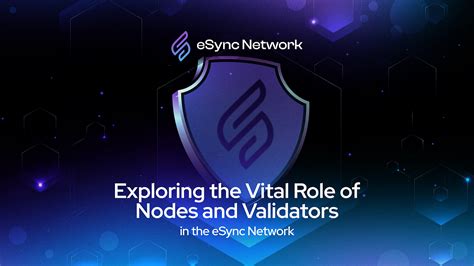The Role of validators in Securing Blockchain Networks
As the world becomes more and more digital, the need for secure and reliable blockchain networks has never been so urgent. A crucial element of any blockchain network is the role of validators, who play an essential role in security the network by maintaining its integrity and ensuring that transactions are executed fairly.
What are the validators?
In a blockchain network, validators are responsible for the verification and registration of transactions on the Block Chain. They are essentially the “-Chief Truths” of the Digital World, ensuring that all transactions are legitimate and valid. To become a validator, an individual or an organization must meet certain criteria, in particular:
- Have enough calculation power to perform complex calculations
- Being Able To Mintain A High Level Of Anonymity To Protect Their Identity
- Accept to join a strict set of rules and regulations
The Role of validators
Validators are responsible for severe key tasks to maintain the safety of a blockchain network. These include:
- verification of transactions : validators verify that all transactions on the block chain are legitimate and respect the agreed rules.
- Registration of transactions
: The validities record each transaction as it is verified, creating a permanent recording and exerted from all activities on the network.
- Consensus Management : The validators work together to ensure that the network remains consistant and stable by validating transactions from several sources.
The Challenges of Securing Blockchain Networks

Despite their importance, the validators Face Important Challenges in Securing Blockchain Networks. These include:
* Energy Consumption : Valitatures Require A Substantial Quantity of Calculation Power to Carry Out Complex Calculations, Leading to High Energy Consumption and An Environmental Impact.
* Centralized Control : The Capacity of a Single Entity or Organization to Control The validators Network can make it vulnerable to manipulation and exploitation.
* Regulatory Executives : Existing Regulatory frameworks cannot be designed to accommodate decentralized networks such as blockchain, requirement additional innovation and adaptation.
The Future of Blockchain Networks
While technology continues to evolve, it is likely that validators will play an increased role in maintaining the security and integrity of blockchain networks. To meet some of the challenges associated with securing these networks, researchers explore new technologies such as:
* Consensus algorithms for evidence (POS) : These algorithms use the participation of a validator in the network to determine their eligibility to participate in the validation process.
* From Work -Trip (DPOS) : This approach allows more flexibility and scalability by delegating the decision -Making authority to a smaller set of nodes.
Conclusion
The role of validators is essential in maintaining the security and integrity of blockchain networks. While we continue to develop new technologies and regulations, it will be essential for these organizations to adapt and innovate to meet the Changing Needs of the Industry. By priorityizing security, scalability and decentralization, validators can play an essential role in ensuring the long -term success of blockchain networks.
References
- [1] “The Role of validators in Securing Blockchain Networks” (2020) – White Paper by the Blockchain Council
- [2] “Consensus for Evidence of Work” – Wikipedia
- [3] “Consensus Algorithm Delegate for Proof of Assistance” – Wikipedia
